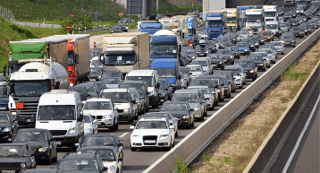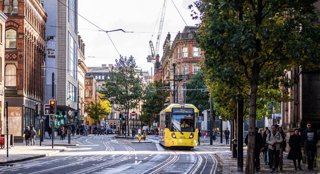A project designed to dramatically reduce traffic congestion and pollution by using real-time data has passed its next phase.
Oxfordshire County Council’s (OCC) research and innovation team, iHub, and Alchera Data Technologies have successfully completed phase two of its New Mobility project.
The overarching goal of the two-phase project was to enable data-driven decisions for transport network management supported by a collaborative data environment.
In phase one, Alchera undertook a research project with control room users and then fused floating vehicle data from TomTom with existing under-road counters by CA Traffic to successfully detect abnormal traffic conditions, which enabled OCC’s transport team to react faster to adverse conditions across the road network.
Ruth Anderson, future of mobility team leader at OCC’s iHub, said: “Finding a way to ensure all of Oxfordshire’s transport systems have access to the same data on which to make real-time decisions is critical.
“We can’t possibly hope to build intelligent infrastructure if all the systems are using different data.
“Alchera’s data hub, Alpha, gives us the ability to coordinate all our transport systems’ data needs, ensuring consistent analysis across the board both in real-time and historically to understand the impact of decisions.”
Phase two built on the earlier successes and developed a functioning transport data exchange specifically designed for public sector data analysts containing mobility data from a range of sources including CCTV networks and ANPR cameras.
Laura Peacock, innovation hub manager at Oxfordshire County Council, said: "The inclusion of accurate, real-time mobility data will become increasingly important in the operation of advanced transport systems of the future.
“It’s great to see companies like Alchera bringing exciting new technologies that will change the game; their approach has huge potential. We should expect to see some disruptive dynamic business models emerge off the back of this.”
Alchera’s machine learning algorithms make use of existing city sensors and camera networks.
The systems developed will lead to a prototype system that will be capable of offering transport data to technology development companies and the public.
As well as work to enable connected and autonomous vehicles on our roads, other developments that could emerge from the research are live data apps on transport flows and patterns.
The research involved and the final product aims to also enable better collaboration within the council on data sharing work on transport.
Anna Jordan, co-founder at Alchera Technologies, said: “When you are trying to deal with complex, congested cities, being able to react to situations in real-time is key.
“Our largest system integration combines thousands of sensor sources and performs hundreds of thousands of measurements every day. This represents the only demonstration of absolute, real-time traffic counts and classifications, at city scale, in the UK today.
“Data in the system is handled in a fully transparent and auditable way - recognising that data ownership and usage will be critical in future smart cities.”
The smart cities solution uses an AI-powered software platform to give real-time data on vehicle and pedestrian movements around cities and major infrastructure.
The project was funded with a share of £1.25 million in Small Business Research Initiative funding from the Government.






















Login to comment
Comments
No comments have been made yet.